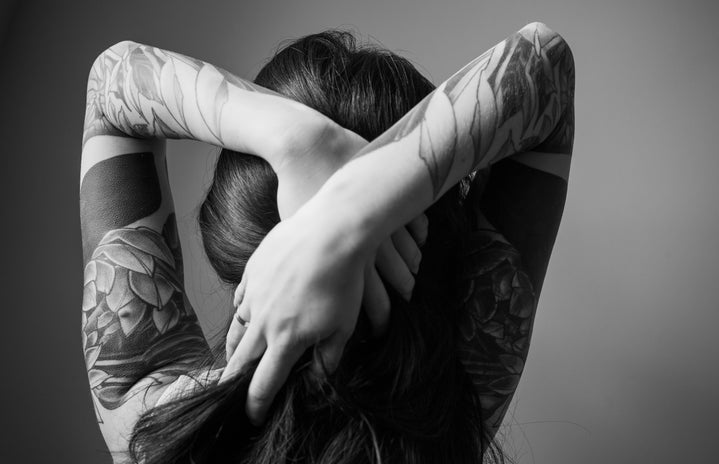While some people do not ever consider getting a tattoo, others count down the days until they are legally old enough to be able to get one. I myself am included in the latter category. Although the experience of planning out and getting a tattoo is wildly exciting, it is also a huge decision as tattoos are permanent, unless you want to spend more money on laser tattoo removal. As to be expected, as a first-timer, you might have a lot of questions about the process of getting a tattoo. Since my eighteenth birthday, I have gotten four tattoos, one of which is a decent-sized thigh piece. With that being said, I figured I have enough tattoo experience to be able to answer common questions I have heard and also give some advice in regard to issues I have experienced firsthand.
What should you get tattooed?
Choosing what you want to get a tattoo of is the first step in the entire process. It varies widely regarding what people decide to get permanently etched onto their body, but the most important factor to remember here is that a tattoo is permanent. As I mentioned above, unless you want to spend thousands of dollars and multiple sessions on laser tattoo removal, you need to be completely satisfied with your selection. I cannot give specific recommendations for what to get or what to not get a tattoo of, as this is a personal decision, but I do highly suggest that you spend a significant portion of time thinking about what you want tattooed. For first-timers, I recommend spending at least a few months thinking over a specific tattoo design. It is important to gauge if you want tattoos that have sentimental and/or personal value to you, if you want tattoos that just look cool, or a combination of both. I myself have tattoos that fall into the first category as they all mean something deeply important to me, but I know others who get tattoos simply when they like the design. Also, think about if you want color in your tattoo or not. Color fades more over time as opposed to black and white. A final point of emphasis in this section is that the younger you are, the more likely you are to change your mind later, so really take the time to consider if you want a piece on your body forever.
Where should you get a tattoo?
- Where on your body should you get a tattoo?
There are some guiding questions that I use when selecting a location on my body to get a tattoo. These questions are related to the important factors that make up my overall lifestyle. The first question I would ask is if you have a spot in mind for the tattoo. If you do, you need to think about if this location is a wise idea. If you don’t, you can work through these others questions and see if any location comes to mind. As with the substance of the tattoo itself, think carefully about where you want it! Ask yourself if visible tattoos, meaning tattoos that can be seen when you are dressed, will impede you from landing future jobs. This is a very important question to ask yourself if you are entering certain professions, so do research on your own about how tattoos are viewed in your field. I also suggest thinking about what the content of the tattoo is and if it could be taken offensively as you do not want tattoos of this type showing in a workplace. Secondly, ask yourself about your lifestyle and how well the integrity of the tattoo would be preserved. For example, if you work in an environment where you burn your hands or ride bikes and often fall and scrape your shins, the life of a tattoo in these either of these areas will be compromised over time. Third, is the skin suitable for a tattoo? I will address my own experience with this question in the complications section, but thinking about any sun exposure, scarring, areas with frequent weight changes, or likely future injury will help you eliminate potential locations.
- What is important to look for in a tattoo shop and artist?
As a general rule, if it looks and feels sketchy, it probably is. With that being said, it is vital to do your research. Start with asking other people what shops and artists they recommend. From there, you can look up the shop and read more reviews on the internet and social media. I think it is important to look at what the overall style of tattoos most of the artists at the shop do. If you do not like them, a different shop would be more appropriate for you. If a particular shop stands out in style and customer reviews, start looking on either a website or a Facebook or Instagram page at the specific artists and their work. This will help you tremendously in choosing an artist. Throughout your selection process, consider your price range as shops vary in how much work costs, and some shops have a shop minimum, which is a starting flat rate for pieces done. Please, do not go cheap on a tattoo just because you can. It is better to choose good, pricey work (but not overpriced) than to receive subpar work that you regret later.
When should you get a tattoo?
Timing is also important! Think about when in your life allows for the time to physically go get a tattoo as well as allow it to fully heal. While this may have never crossed your mind, the conditions you subject your body to are very important for tattoo healing. If you are in the sun constantly in the summer, getting a piece done on an area that will be exposed most of the time does not provide ideal conditions for healing. As another example, if you struggle to keep your skin hydrated in the winter, you may encounter tattoo complications. If you participate in activities that scratch your skin during part of the year, aim to get a tattoo when this injury is avoidable. Thinking about which of the four seasons or which months your skin tends to be the most protected in is extremely helpful for appointment planning.
Possible tattoo complications
Tattoo complications are not bound to happen, but it is better to know what could happen than to find out about it later. Luckily, most of the time that these problems occur, they are minor and not noticeable to anyone besides yourself! These issues range from visual flaws to physical ailments. There are additional issues that can occur aside from the ones I have listed, but these are the ones that seem to come up the most for myself and other people that I know.
- Rapid ink fading
The fading of a tattoo can be due to improper aftercare, skin damage, artist technique and ink quality. Find more detailed explanations of ink fading here: https://authoritytattoo.com/do-all-tattoos-fade/
- Tattoo injuries (scrapes, cuts, etc.)
Especially in vulnerable areas of the body, tattoos are prone to injury. The most vital time to protect a tattoo is during the initial healing period as this is the stage in which the ink is not yet fully settled into the dermis. By following aftercare procedures and taking proper precautions to avoid injuries and care for them promptly, you can avoid damaging your tattoo and improper healing. If you are concerned about possible injuries to the skin freshly tattooed, read over this article: https://authoritytattoo.com/cut-or-graze-on-tattoo/
- Blisters and allergic reactions
Once again, blisters and other skin issues are most common during the healing period due to excess moisture and/or infection. However, there can be other skin allergic reactions that result in bubbling/blistering. My first tattoo was unknowingly applied on skin that is prone to sun blemishes (This is why location is SO important!). During the second year of having the tattoo, the skin underneath became irritated and began to blister, resulting in ink loss and displacement. For more details on tattoo blisters, read this article: https://authoritytattoo.com/tattoo-blisters/
This article explains other skin issues, including various allergic reactions, that can occur that may damage the tattoo: https://www.aad.org/public/everyday-care/skin-care-basics/tattoos/tattoo-skin-reactions
- Blowout
This issue is characterized by the spreading and blurry appearance of ink shortly after getting a new tattoo. There are various causes for this issue that mostly come down to factors during the tattoo process itself. There are not many fixes to this problem othe than tattooing over the piece or having laser removal done. However, you can avoid this issue by selecting a professional artist and thinking about the suitability of the skin you want tattooed. Linked is a guide explaining the causes of tattoo blowout: https://www.savedtattoo.com/tattoo-blowout-or-still-healing/
- Infection
This is the most severe complication that may arise from getting a new tattoo, and you should seek immediate attention from your artist and a medical provider if you suspect you may have an infection. Pay close attention to any symptoms of an infection, such as a fever, red streaks, lesions, a burning sensation, pus, swelling, or excessive pain.


